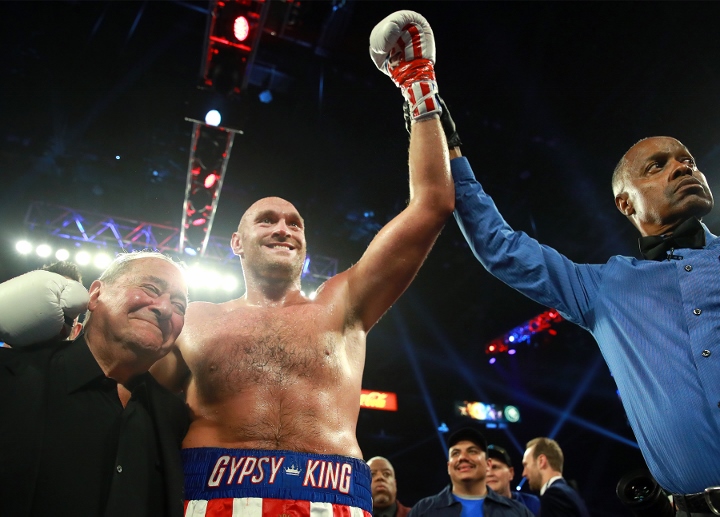By Jake Donovan
When all was said and done, the hype far exceeded the response for Tyson Fury’s alleged Las Vegas takeover.
The unbeaten heavyweight from England enjoyed a sea of promotion ahead of his Vegas debut in a 2nd round knockout of Germany’s Tom Schwarz. The June 15 headliner at MGM Grand in Las Vegas, Nevada generated a live gate of $882,145 from 5,489 tickets sold, according to final receipts submitted to the Nevada State Athletic Commission.
Another 1,187 complimentary tickets were issued to patrons, though the combined accounted total of 6,676 falls well short of the announced and alleged sold-out crowd of 9,012 by event handlers on fight night.
Final numbers for the ESPN+ event—Fury’s first of a $100 million deal he signed with Top Rank and ESPN—have not yet been released. A lead-in preliminary card on ESPN2—topped by 2016 U.S. Olympian and unbeaten super featherweight Mikaela Mayer—averaged 493,000 viewers over the course of the three-plus hour telecast, with the viewing audience growing to more than 800,00 viewers for Mayer’s 10-round win over Lizbeth Crespo.
The bout was just Fury’s third career fight in the United States but also his second straight. The former lineal heavyweight champion entered the bout six months removed from a 12-round draw versus undefeated titlist Deontay Wilder last December at Staples Center in Los Angeles, Calif.
That bout marked the U.S. Pay-Per-View debut for both boxers, with the Showtime PPV event selling a reported 325,000 units. Final gate receipts for the event still have yet to be released, as filed documents with the California State Athletic Commission aren’t subject to public record as is the case in the state of Nevada, where promoters are required to file final receipts no later than 10 days after an event.
Regarding his divisional rival, the Vegas debut for Fury (28-0-1, 20KOs) slightly eclipsed that of Wilder’s first headliner in the boxing capital of the world, also at the MGM Grand. That moment came in Jan. 2015, when Wilder pitched a virtual shutout of Bermane Stiverne to begin a title reign that is still running strong more than four years later.
The watershed moment in his career produced a live gate of $755,200 from 4,074 tickets sold amidst an announced crowd of 8,454 on fight night.
Wilder (41-0-1, 40KOs) has since become an established draw in his home state of Alabama—his four title defenses in state performing well but not mind blowing at the box office—as well as at Brooklyn’s Barclays Center where three of his four fights in the venue have played to near-capacity crowds.
The lone exception of the four at Barclays came in his last fight, a highlight-reel 1st round knockout of mandatory challenger Dominic Breazeale. The May 18 Showtime-headlining affair played to an announced crowd of 13,181, although—a lesson often learned once Vegas event receipts are released—the number was significantly inflated and with several thousand complimentary tickets given away.
Wedged in between knockout wins for Wilder and Fury was the one event which performed remarkably well at the box-office—only for its A-side headliner to miserably flop in the ring.
Anthony Joshua made a big financial splash in his U.S. debut, playing to more than 20,000 in attendance at Madison Square Garden. By night’s end, he made a mess atop the heavyweight division in suffering his first career defeat after late replacement Andy Ruiz Jr. scored a stunning 7th round knockout to become the first-ever Mexican boxer to win a slice of the heavyweight crown.
Following Joshua’s loss, Fury alleged that the heavyweight big three is now down to the big two. It carries a nice ring ahead of claims from both his and Wilder’s camp that a rematch is forthcoming in the first part of 2020. By then, Ruiz and Joshua will have—barring a postponement or outright cancelation—will have fought in their own rematch.
Assuming both fights play out, it will serve as an important step towards narrowing down the heavyweight field. Because if there’s anything the past five weeks of heavyweight action has proven—more so than that fight night attendance will almost never match the final gate receipts—it’s that the heavyweight big three that has now grown into the big four need each other far more than any of them would like to admit.
Jake Donovan is a senior writer for BoxingScene.com. Twitter: @JakeNDaBox


ADD COMMENT VIEW COMMENTS (160)